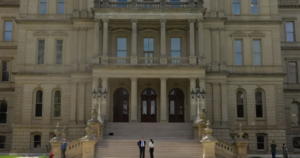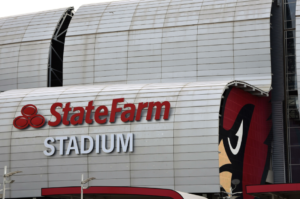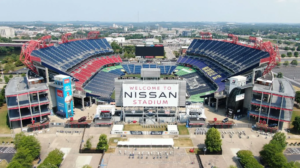Questions remain with financing of new Tennessee Titans domed stadium

After $500 million in funding for a new Tennessee Titans stadium passed Tennessee’s Legislature last week, the next step in the public funding portion of the deal will be funding from Metro Nashville.
Metro Nashville officials will need to approve a proposed 1 percentage point increase in a Davidson County hotel tax if it is signed into law by Gov. Bill Lee. The tax bill is set to be discussed by the Tennessee House on Wednesday.
The tax proposal, brought by Nashville’s hotel owners, is estimated to raise $10 million annually that Metro Nashville could use toward a $700 million commitment to a new stadium. Cost estimates for the new facility range from $1.9 billion to $2.2 billion.
Titans Chief Executive Officer Burke Nihill gave several interviews on April 22, including with radio station 104-5 The Zone where he said that the full estimated costs of a new stadium are not determined and “there is a lot of work ahead” with Nashville with hopes that a deal can be reached by the fall.
Nihill also said that estimates of a $700 million investment from Titans ownership is a “fair” estimate.
“As we sit here today, we have a lease that was drawn in the late ’90s and the lease is very unfavorable for the taxpayers of Davidson County,” Nihill said. “What we have been trying to do is to find an elegant solution, a lease that does the opposite of the current lease.
“That actually takes the taxpayers out of that position and puts the Titans in that position where we ultimately are responsible for the go-forward maintenance and capital efforts with the stadium.”
Nihill is referencing stipulations in the current lease where upkeep and repair costs at the stadium come from Metro Nashville’s general fund, along with a stipulation that the city has a “first-class” stadium. Instead, like the state will do, Nashville is expected to utilize bonds to pay for its $700 million investment with the hotel and other taxes used as collateral.
Another financing question still unanswered is whether a $200 million loan from the National Football League referenced by Rep. Jason Zachary, R-Knoxville, will be part of Titans’ ownership’s share of the stadium funding.
Also undecided is whether Metro Nashville or the Titans will receive the sales tax revenue at Nissan Stadium and surrounding area and whether it will be used to pay off the Metro bonds or given to the team for their portion of stadium expenses.
The sales tax deal includes a 5.5% sales tax from tickets and sales at Nissan Stadium along with half of the 5.5% sales tax from a planned development on the 130 acres surrounding a potential new stadium, estimated in a fiscal note to be worth $10 million annually once the development is completed.
“In looking around for solutions that are more sustainable, that are not going to result in a lease that is a taxpayer burden long-term, we looked at the real estate with the city and recognized that it’s not really generating any sales tax, it’s not generating any property tax and this is an attractive part of town,” Nihill said. “And, increasingly so now that Oracle is moving in and there is a lot of interest in the rest of East Bank.
“So, if that property can be fired up and it can be creating sales tax and be creating property tax that doesn’t exist today, some of that property tax and some of that sales tax can be used to fund a stadium or to keep it maintained.”
That, however, has not been what sports economists have found when studying new stadiums and surrounding neighborhoods or entertainment districts.
“This is like a three-card monte game on Broadway, and taxpayers are the mark,” said sports economist J.C. Bradbury from Kennesaw (Ga.) State University. “To move the tax burden to an area around the development doesn’t remove the burden from taxpayers at all. It’s just a gimmick that shifts it and makes it less transparent.
“Local spending is local spending, whether it happens around the stadium or at other local businesses.”
Bradbury and others have found that spending at new stadiums isn’t new but diverted from elsewhere in a city, meaning the sales tax conceded at the new venue is sales tax lost from elsewhere in the city, leaving a hole in the budgets for Metro Nashville and the state.
The stadium is expected to take 31 months to build, once approved, and is expected to be ready for the 2026 season. But Nihill told the Tennessean that the stadium could be ready for a 2026 World Cup if the city earns a bid for the soccer event.
Nihill told 104-5 that details such as whether the stadium would be a dome or have a retractable roof, which he notes are open just 3% of the time at current stadiums, have yet to be decided as well as whether it will have grass or an artificial surface or what will be done with seat licenses held by season-ticket holders.
Tennessee State University football would still be able to play home games at the stadium, like it did in 2021 at Nissan Stadium under head coach Eddie George, a former Titans running back.
This article was originally posted on Questions remain with financing of new Tennessee Titans domed stadium







